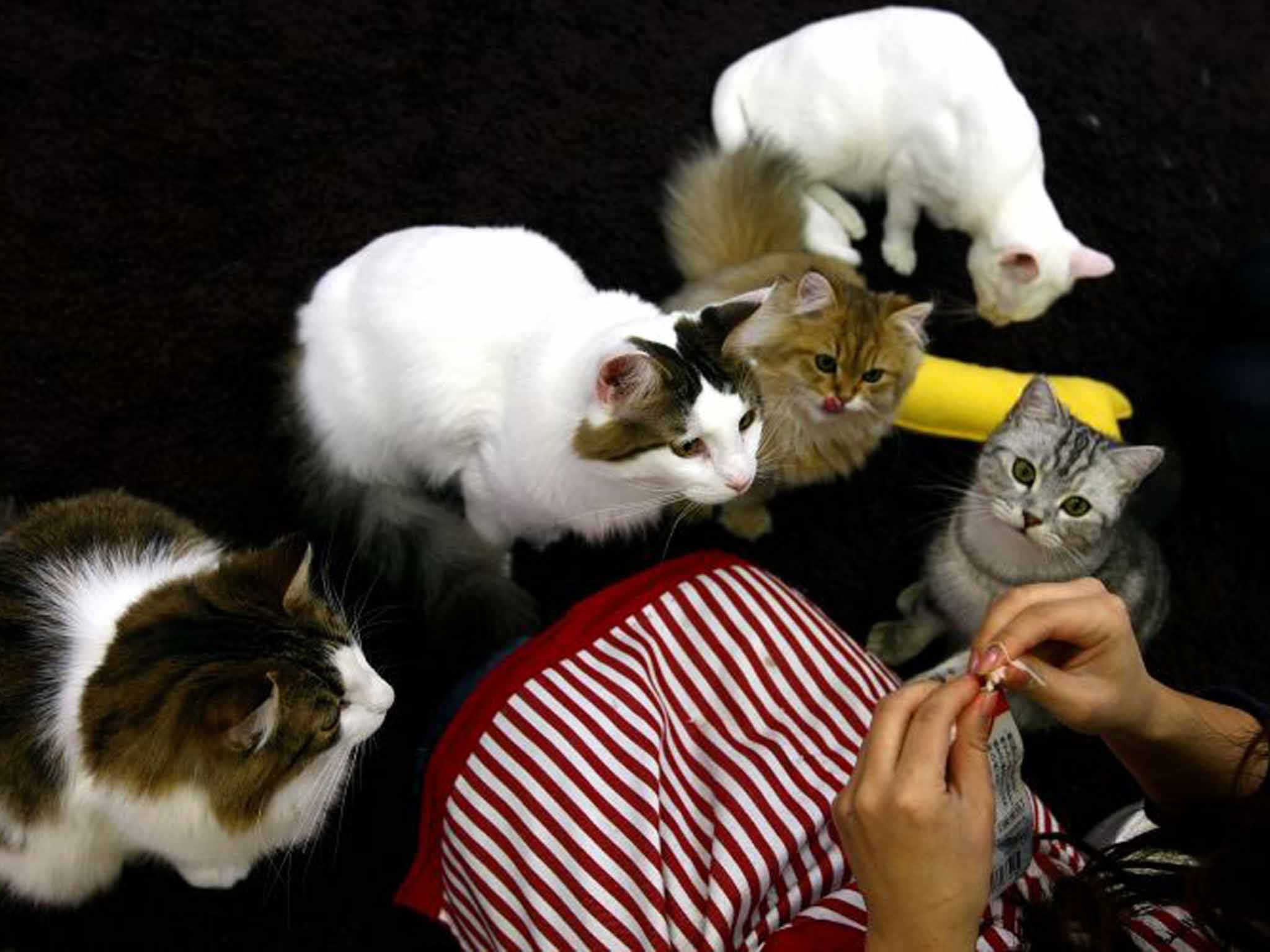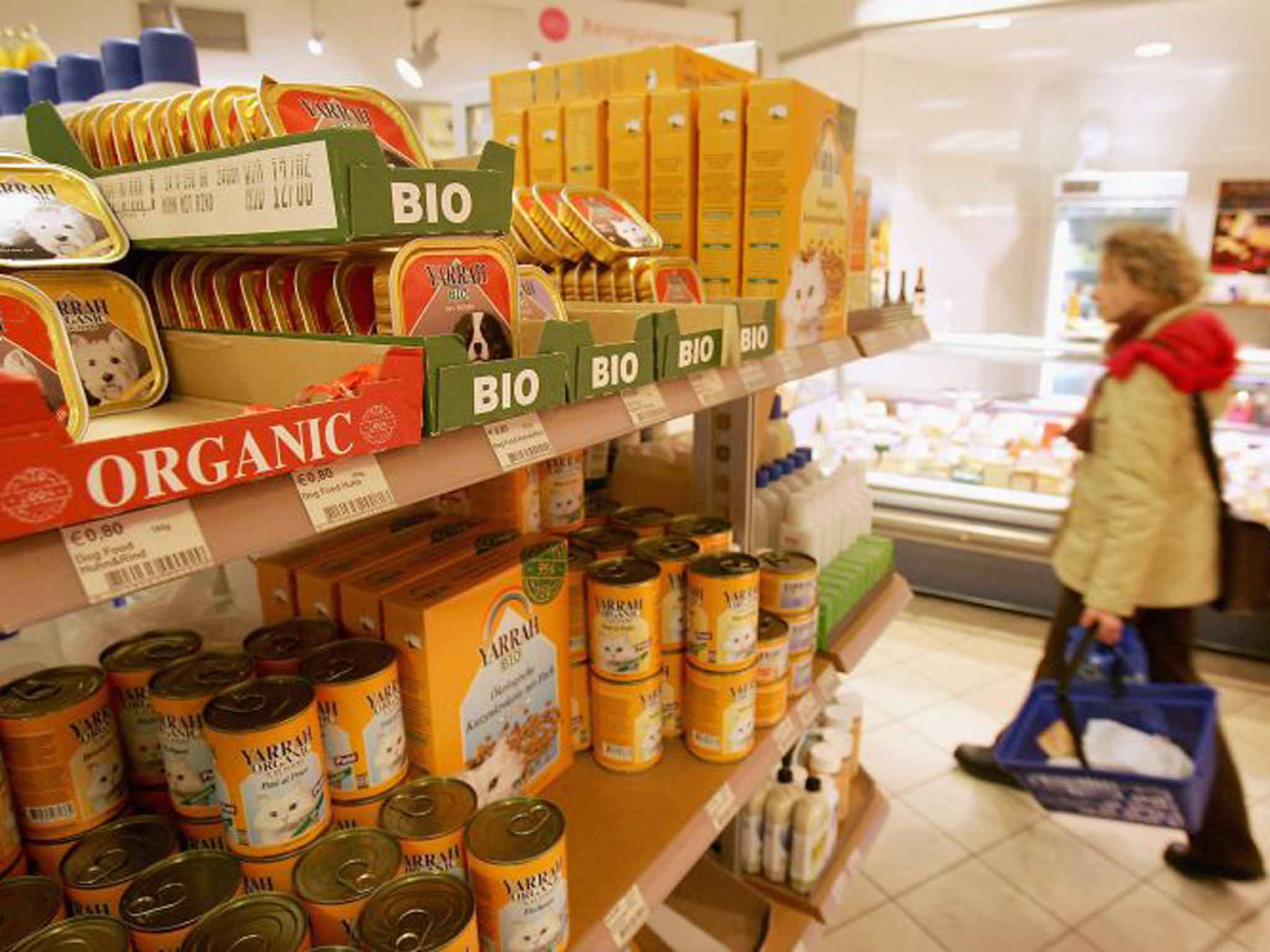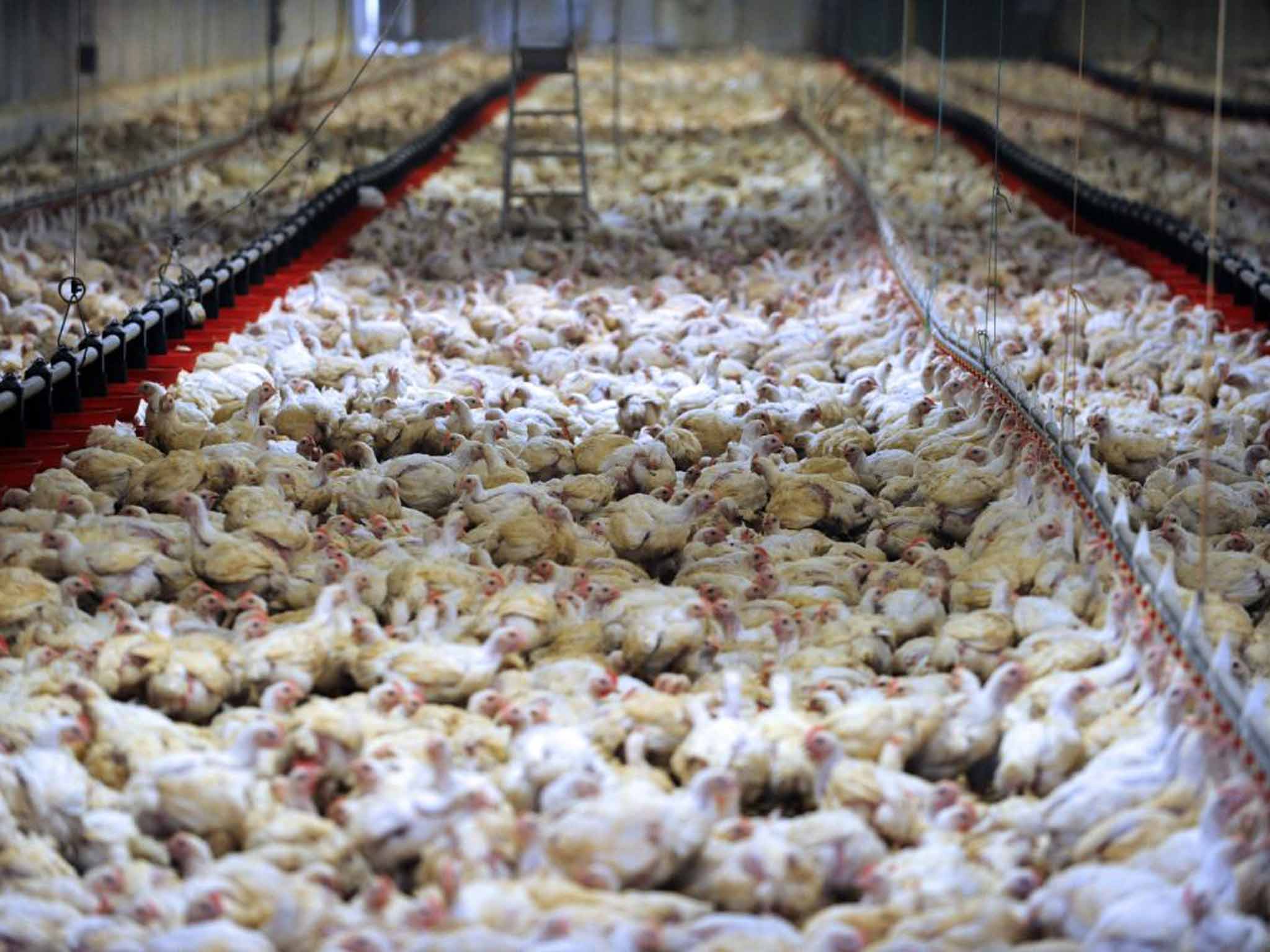The ethics of pet food: Why are we are so selective in how we show animals our love?
For a nation of animal lovers, we are surprisingly unconcerned about the food we give our pets. Julian Baggini reports on why there is such a lack of ethical options and the hypocrisy at the heart of the way we show animals love

In every town and city in Britain, you'll see domestic cats patrolling their gardens and dogs taking their human slaves for walks. We are famously a nation of animal lovers. And yet our love for animals appears to stop at our pets' feeding bowls. Interest in free-range meats for humans is growing, but the only animal welfare that seems to count when buying pet foods is that of the beast being fed. Scan the shelves of the pet-food aisle and you'll struggle to see anything carrying an assurance of higher livestock welfare, such as an RSPCA Freedom Food label or organic certification.
This lacuna is especially incongruous in April, decreed National Pet Month by the Pet Food Manufacturers Association (PFMA) and the National Office of Animal Health, which represents the UK animal-medicines industry. The month is supported by a number of pet health and welfare organisations, but farm animals are not invited to the party. It aims to "help promote responsible pet ownership" but ignores the issue of responsible husbandry. This year it will "shine a light on the positive impact pets have on the elderly and highlight the need for forever homes for older pets", but barns, pastures and farmyards are being left in the dark.
Given that the average shopper doesn't like to think too much about where even steaks come from, it is not surprising that few seek to find out more about the provenance of their pets' food. As research released today proves, there is little public interest in finding out what the food they buy for their pet actually contains. A spokesperson for the PFMA told me that "pet-food manufacturers use raw materials which are by-products of the human food chain. For instance, the industry uses a lot of offal, which is no longer consumed that much by the UK consumer. These ingredients come from animals which have been passed as fit for human consumption under veterinary supervision before their slaughter."
The PFMA stresses that because these ingredients come from the human food chain, the animals that they are taken from meet the same welfare standards as those from which our steaks and chicken breasts are carved. So it might seem that animal welfare is no more or less an issue for pet food than it is for human food.

The problem with that argument, however, is that it assumes the welfare standards for the human food chain are as high as they should be, something that many experts would dispute. Very little human meat and poultry is produced according to higher welfare standards. Most merits only the Red Tractor label, which Compassion in World Farming (CIWF) ranked the lowest in a study into how different welfare standards compare. CIWF says the label "was found often to offer little more on animal welfare than compliance with minimum legislation".
CIWF points out that this legal minimum allows dairy cows to be housed year-round in zero-grazing systems; mothering sows to be kept in "farrowing crates so narrow they can't even turn around"; and broiler chickens to be "crammed into sheds at stocking densities that allow very little room to act out natural behaviours such as foraging and dust bathing".
The mismatch between the conditions these farm animals live in and the pampered homes of the pets that feed on them is extraordinary. As CIWF's chief executive, Philip Lymbery, put it: "How many pet owners would be shocked to learn that their beautiful sentient creature is being fed on the misery of another?"
In fact, not only will you struggle to find any pet food carrying the Red Tractor logo and the limited assurances it provides, but not all UK farming even meets even this standard. Red Tractor accounts for around 90 per cent of UK pig and poultry production, 82 per cent of beef and 65 per cent of lamb. And 20 per cent of the raw materials used in UK pet-food production come from outside the UK. So although the PFMA is correct to say that British meat used in pet food is "sourced from approved abattoirs whose operations are monitored under the Food Standards Agency to ensure animal welfare standards are complied with", these standards are not as high as they could be, and not all the meat passes through British abattoirs anyway.
So why is it that we are so selective – if not downright hypocritical – in how we show animals our love? John Burns, the owner of Burns pet-food company, suggests that being "animal lovers" is part of the problem. Burns says vets such as him "are not allowed to be animal lovers" because such people become "too sentimentally attached" to animals. He would rather be described as "concerned for animals". "There are people who are sentimentally attached to their pets who will feed them to death," Burns says. "They don't think about the wider aspects, they only think about the health of their own animals" – and even then, they often get it wrong.

I met Burns because his is one of the few manufacturers which puts any emphasis on livestock welfare. His 300-acre Penlan Farm on the outskirts of Kidwelly, Wales, provides most of the ingredients, including free-range eggs, for his moist dog food. But even Burns is limited in how high he can raise his standards. His dry food is made by someone else, and he can't use free-range animals for that. "The chicken that goes into our food is probably broiler chickens, which are reared intensively, but they aren't caged," he tells me. "The best we can hope for is that these chickens which are being reared intensively get a better standard: more room, for example, smaller numbers, even."
There are, however, a handful of small pet- food manufacturers using solely higher-welfare meat, such as Laverstoke Park's raw-food range, which is largely organic. Honey's Real Dog Food also uses wild and free-range meats, and claims to be "the only dog-food company [to] visit the farms we are buying our ingredients from to ensure their welfare".
Burns, however, claims he could not go free-range tomorrow because "the ingredients are not available in any quantity". He calculates that around a hundred tons of chicken each month goes into his dry food alone. He once did the arithmetic to see if he could use his own chickens and found it just wasn't feasible. "If the human food market in free-range expanded enough, then perhaps that could happen. But from an animal-welfare point of view, the best we can hope for is that animals that are reared primarily for human consumption should be reared in a better way, and I think to de-intensify is as much as we can hope for. Anything that happens in pet food follows from the human food."
That is the nub of the problem. As the PFMA says, "no animals are reared and slaughtered specifically for pet food", because it uses only by-products. And "because of the way the by-products are produced, it would be difficult for many manufacturers to specifically request meat from animals with a higher animal welfare status".
Honey's and Laverstoke show it can be done. Honey's told me that "we mainly use the parts of the animal that tend not to be used so readily in the human food chain, rather than use whole carcasses from animals killed specifically for us". Laverstoke also says it mainly uses offal and "we don't use cuts that humans would eat".
Both are small, niche operations, however, and it does make the resulting food comparatively expensive. A kilo of Laverstoke's raw dog food costs around £5.50 at Ocado, whereas for around £1.50 more you can get three times the quantity of Pedigree dry food. An organic terrine of Waitrose's own-label dog food, however, is 55p compared with 42p for conventional, which suggests that with enough will, higher-welfare pet food need not be prohibitively expensive.
Burns thinks the larger pet-food manufacturers are dodging their responsibilities when they say they are dependent on what the human food industry is doing. "They're basically saying, 'It's not our problem, it's nothing to do with us,'" he says. "If the pet-food industry said, 'We're not going to buy your stuff if you don't improve animal welfare,' that would put pressure on." But then, as he asks himself, is the pet-food industry big and powerful enough to do this? I doubt it. It would be like expecting the scrap-metal industry to be able to demand cost-raising changes in car design.
"Sadly, the pet-food industry helps prop up factory farming by using meat and by-products from animals all too often kept in the most appalling conditions," Lymbery argues. "There is a real need for the pet-food industry to look closely at the ethics involved in the ingredients they may be using." The PFMA itself acknowledges that "smaller manufacturers that buy directly from the human food chain would be able to specifically request meat from animals with a higher animal welfare status", pointing out that "a number of our members actively promote their animal-welfare credentials, which extend beyond the meat ingredients, for instance sourcing free-range eggs and using Marine Stewardship Council-certified fish".
It is nonetheless true that mainstream pet- food production works with the grain of the larger meat industry and is constrained at least in part by how it operates. The fact is that there is still not enough demand for higher-welfare meat, even for humans. And the bottom line is that people are sometimes not able, but more often not willing, to pay the price for more humanely reared meat. "People are thinking, 'How much does this cost?' not, 'How does it get there?' – not just for animals but for their own food as well," Burns says. "It's become a way of life for us that no matter how much other things cost, food should be cheap."
Major changes would require co-operation between the human- and pet-food industries. Is this feasible? I don't see why not, since both sectors could help to solve each other's problems when it comes to making higher-welfare meat economically viable. I remember Nick Hindle, the senior vice-president of corporate affairs for McDonald's in the UK, once explaining to me why the company had not switched to using free-range chicken. "We would not see the uplift in sales or preparedness to pay more by going free-range," he said. "I know, because we've done the research." His customers want breast meat, which would leave McDonald's with millions of premium-price de-breasted carcasses to get rid of, and there just isn't the market for them. But couldn't a forward-thinking pet-food company create that market? Of course, it would still be more expensive than other pet food, but perhaps not so much as to make it unmarketable. The maths would look even more attractive if the carcass share were with a KFC or Nando's, which take wings and thighs as well.
The bottom line, however, is that this will never happen if pet-food companies don't feel the demand for higher-welfare pet food from customers willing to pay for it. In the absence of that demand, it is not an issue that the industry seems eager to engage with. The PFMA provided me with a statement, but despite weeks of trying, neither it nor I could find a member company willing to discuss it further. I went back and forth with Mars Petcare, whose brands include Whiskas, Pedigree, KiteKat and Sheba, but in the end its PR simply said that "having reviewed the PFMA statement", it "stands behind the PFMA and industry view and wouldn't be able to add anything to this".
Pet owners who are real animal lovers should realise that this is not good enough and demand more. If National Pet Month means anything more than another opportunity to indulge our sentimentality for animals, it should be a time to start waking up to the double standards we expose every time we open a can of pet food.
Julian Baggini's latest book is 'Freedom Regained: The Possibility of Free Will' (Granta). See microphilosophy.net
Join our commenting forum
Join thought-provoking conversations, follow other Independent readers and see their replies
Comments
Bookmark popover
Removed from bookmarks